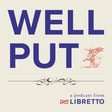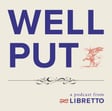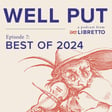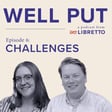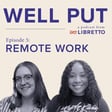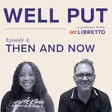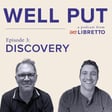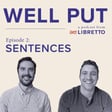Become a Creator today!Start creating today - Share your story with the world!
Start for free
00:00:00
00:00:01

Episode 1: Our Favorite Campaign Themes
When it comes to securing millions in philanthropic contributions, a theme is much more than a way to refer to your campaign—it's a rallying cry for your entire community.
Libretto has developed names and themes for campaigns that have collectively raised over $5 billion. Join Adrian and Connor as they talk about what qualities make a successful campaign theme and share some of their favorites.
Learn more about Libretto at libretto-inc.com.
Hosted by Connor Ferguson and Adrian Pio
Produced by Tiffany Carlson
Edited by Connor Ferguson
Music by Coma-Media, via Pixabay
© 2024 Libretto. All rights reserved.
Recommended
Transcript
Introduction to Well Put Podcast
00:00:13
Speaker
Welcome to Well Put, a podcast about communications for mission-driven organizations from Libretto. I'm Conor Ferguson. And I'm Adrian Pio. As Conor said, we are from a firm called Libretto. We're a communications firm that specializes in helping mission-driven organizations articulate what they do, believe, and hope to achieve.
Libretto's Communication Strategy for Mission-Driven Organizations
00:00:33
Speaker
And that can take the form of anything from high-level messaging, helping an organization articulate their strategy, down to public-facing communications and content that might be shared with donors, with students, with folks who are engaging with that organization at many different levels.
00:00:47
Speaker
Today,
Creativity in Campaign Themes
00:00:48
Speaker
we're here to talk about a very high-level communications vehicle, which is the theme for a campaign or a fundraising initiative. Yeah, themes are maybe one of the most fun and creative aspects of our practice. A campaign theme or a campaign name is, you know, sort of a moniker that can sit ah above a major fundraising initiative. So we wanted to talk a little bit about some of our favorite campaign themes, um both some themes that Libretto has developed ourselves and also ah some themes that we've just encountered out in the wild.
00:01:24
Speaker
um and talk a little bit about what we think makes them effective vehicles for fundraising communications.
Essentials of Distinctive Campaign Themes
00:01:32
Speaker
Yeah, that's ah actually a a great place to start, Connor. When you're thinking about great themes, what are some of the points that you are looking for?
00:01:40
Speaker
Well, some of the points that I would be looking for is it needs to feel distinctive. It needs to feel authentic to the organization that this fundraising initiative is about um and also to the particular goals of this fundraising initiative.
00:01:57
Speaker
I think another point that can sometimes fly under the radar, and but as you mentioned, you know when you're raising millions of dollars, hundreds of millions of dollars for some of these large organizations, you really wanna have and a name that you can point to, that you can hang your hat on, that's that's some way to refer to the initiative that's underway.
00:02:15
Speaker
And that goes both in print and when you're speaking, you want to make sure that you have a name that sounds good when it's said aloud, that doesn't get confusing when you're trying to talk to somebody on the telephone, something that can work really well in the subject line of an email.
00:02:27
Speaker
um So sometimes, you know, it's sort of silly to think about it, but one of the most important things is really just the way that it is constructed, the words that make up the theme. Are they intelligible? Are they clear? Are they easy to understand and to read? Do they have double meanings in other languages?
The Role of Puns in Campaign Themes
00:02:43
Speaker
and Those types of interesting questions. Although double meanings in English can actually be ah good thing, you know, if there's if there's multiple layers of meaning to to a phrase. And I think that there are a couple of examples that we're going to discuss today of themes that have multiple layers of meaning that can really sort of ah work on work on a couple different levels.
Case Study: 'Elevate' Campaign for National Audubon Society
00:03:05
Speaker
Obviously, puns are ah sometimes, well... Your mileage may vary. Your mileage may vary. I mean, some people... I've often described puns as the lowest form of humor, but I don't think that Adrian and I would ever agree with that statement because puns are fantastic. I think if you can if you can turn a phrase, if you can make a joke in one word, that's kind of an impressive feat. But you have to make sure it's not corny. And that is really the sort of the danger of puns is they can really veer into the corny.
00:03:35
Speaker
Yes, that's true. um Speaking of a one word thing, i know that I don't want to sort of put words in your mouth, but I know that there's one theme that you were thinking of talking about that is, you know, has a little bit of that double meaning kind of thing. And I was wondering if you wanted to start with that as an example of of something that you like.
00:03:55
Speaker
I really thought you were going to say i don't want to put word in your mouth. And i that might be a pun. Well, i I don't want to put this word in your mouth, so I'll let you say it. Yeah, that's an excellent segue to the first on my list. I did want to talk about one word theme, which is elevate the campaign for the National Ottoman Society.
00:04:14
Speaker
and This was launched a couple of years ago in 2022 with about a $750 million dollars goal.
Versatility of Campaign Themes
00:04:20
Speaker
So a very big initiative um encapsulated in just one small, simple word, which I think is really the power of this type of one-worder is you can fit so many different meanings and so many different elements into a phrase like this. Of course, National Audubon Society is the sort of the country, the hemisphere's largest organization of birders.
00:04:42
Speaker
um So elevated, we're thinking about taking flight. There's, of course, a very direct and literal connection to the animals that they're attempting to protect and to save. um But it's also about the organization itself and the work of the campaign to help them raise their sights to look towards a brighter future. to elevate the work that they're each doing individually in a day-to-day basis as staff people.
00:05:02
Speaker
um So I think there's just a lot of different ways for folks to plug into this, even though it is itself so disarmingly simple at time and in
UT Austin's Campaign Theme Potential
00:05:11
Speaker
space. Yeah, and the the sort of field of birds is maybe one of those areas that lends itself to a lot of pretty awful puns, some of which we actually got a chance to use, but um there were definitely some good rejects to the campaign theme that but I particularly like. i was I was particularly fond of prepare for the raptor.
00:05:37
Speaker
You can see why that didn't make the final cut. No, but but then, you know, I mean, the the the the puns of being able to put large bills appreciated on the on the back of the case statement with a photo of ah um some sort of large billed bird.
00:05:55
Speaker
So, Rosyte's boom bill. Rose 8 Spoonbill, exactly, yes. Going back to the actual campaign theme that was that was chosen, Elevate, um the one-worder is obviously to be desired because it's, you know, incredibly short, incredibly has incredible utility. You know, you were talking earlier about um clarity in various different contexts, whether, you know,
00:06:20
Speaker
spoken or written. um a single word is ah just about the epitome of that. It's also, i like these these sorts of campaign themes that can be interpreted in a couple of different ways. So like it could be sort of elevate like a command, like telling donors, you you need to take part in, yeah, step up. Exactly. You need to take part in the process of elevating Audubon of elevating our conservation efforts.
00:06:47
Speaker
um But it can also be sort of more general talking about the ways in which ah Audubon is elevating the field of conservation, is elevating um the conversation around climate change, for instance.
MIT's Campaign Theme: Innovation Meets Tradition
00:07:01
Speaker
Totally. And just to circle back really briefly on the idea of putting words into people's mouths, I think one thing that makes this so effective is that it's really easy for people to use it and to speak to it in casual conversations and professional communications and videos and remarks.
00:07:17
Speaker
um It's really easy to talk about, here's what we're elevating, or we need you to come help us elevate. It just really ties itself nicely to that context. Yeah, it's almost too easy to use in a lot of different contexts. You end up just sort of saying, elevate, elevate, elevate, elevate. But that's probably not a bad problem to have.
00:07:34
Speaker
Staying on message, that's what it's all about. Exactly. um So the the next theme, or the first thing that I wanted to talk about um is not actually a theme that libretto developed, um but it's one that I encountered out in the world.
00:07:51
Speaker
And that is What Starts Here, which is the campaign for UT Austin. One of the things that I really like about this theme, What Starts Here, is that it has great sort of platform potential.
00:08:04
Speaker
What Starts Here can be the basis for a lot of other different types of communications. you can kind of replace that what with
Conversations Around Campaign Themes
00:08:13
Speaker
a lot of different concepts to talk about various different aspects of UT Austin's offering that um make this a distinctive university. So you could talk about innovation starts here, creativity starts here, entrepreneurship starts here.
00:08:30
Speaker
um It becomes a platform for spinning out communications in a lot of different contexts and that's particularly helpful I think when you're talking about a campaign for something as large and multifaceted as an entire university because there's going to be so many different um points of connection and so many different ways that people think of and engage with the university and being able to adapt the theme to a certain extent to nod to all of those different points of connections is a really valuable tool for fundraisers.
00:09:09
Speaker
and You were talking about the way that elevate could be read in sort of multiple moods as an imperative, as a verb form. I think there's an interesting way that we're using they are using the word what here,
00:09:21
Speaker
as sort of an indicative as opposed to a question. It's not asking you what starts here, but it's sort of inviting you to think about that. It's sort of it's causing your brain to go to the interrogative space. It's saying like, oh, should this be a question?
00:09:36
Speaker
And what's the answer? And then, of course, the answer is this. The campaign is what starts here. This this is both the question and the answer in a very interesting way. Yeah, I like that, both the both the question and the answer.
00:09:48
Speaker
That is well put, as we might say on this podcast here. It begins. It begins. We'll have some sort of ding that happens when that when when we say well put.
00:10:01
Speaker
Exactly. Well, at the risk of invoking a pun, the next theme that I wanted to talk about was inventional wisdom. which is a theme that we developed for the 150th anniversary observance at MIT.
00:10:16
Speaker
Obviously, MIT, a space known for innovation, creativity, especially in sort of the engineering
Broad Appeal of Campaign Themes to Students and Community
00:10:22
Speaker
space. So invention ties really nicely to their ethos and culture.
00:10:27
Speaker
And wisdom, of course, playing with the idea of conventional wisdom, intentional wisdom. um This is something that just really seems to fit with their mode of sort of twisting what's expected and what's known and and looking at things from a new perspective, the ability to play with, but also to be respectful of traditions that exist.
00:10:47
Speaker
And this theme actually had sort of a life beyond what we expected in that it's the only thing that we've worked on that has traveled outside of the surface of the Earth. um There were some MIT astronauts were on the International Space Station who brought with them some T-shirts and video down to the gala event to celebrate sort of the launch of the 150th Inventional Wisdom Celebration wearing their Inventional Wisdom shirts, which was sort of an amazing experience to ah have helped to contribute to.
00:11:16
Speaker
Yeah, it's not often that something that you come up with goes to space, um particularly in in, I guess that's that's maybe in a literal sense. It's often the case that it happens figuratively.
00:11:27
Speaker
Right, exactly. Yes. um Inventional wisdom really has sort of a thematic platform potential. um The celebration itself was a 150 day observance where they had all kinds of events, both on campus and as Adrian mentioned in space um that were all sort of and far beyond. Yeah, that were all sort of inspired by this idea of Inventional Wisdom and it was really it became this um sort of intellectual commons where all of these people were coming to MIT or who were already at MIT sharing their form of inventional wisdom, their form of um sort of breaking the mold and all of these ideas that really define what an MIT education and what MIT research and an um MIT innovation stand for.
00:12:22
Speaker
I didn't want to interrupt you, but you sort of stumbled over Inventional Wisdom at one point, and it sounded like you said Inventional Rizdom, and that's sound amazing.
00:12:33
Speaker
Why do we not talk about Rizdom more often? I think we definitely need to start talking about Rizdom now. Yeah, Inventional Rizdom. She has a great Rizdom. Great Rizdom.
00:12:56
Speaker
um right, Connor, you're up next. What do you have for your second theme to share today? So the next thing that I wanted to talk about is another libretto created theme. And this is the work ahead, which is for the campaign
Characteristics of Effective Campaign Themes
00:13:10
Speaker
for JVS Boston, a workforce development agency that um works on promoting equitable employment opportunities, both from the employer and employee side in greater Boston.
00:13:25
Speaker
um And this is a ah really interesting theme because, well, it was a really interesting process of coming up with the messaging and overall communications for this campaign um because we did all of our sort of qualitative discovery for the project in January and February of 2020.
00:13:46
Speaker
And then right after we had collected all of that information, all that stakeholder data, the pandemic hit and we went from record low unemployment to record high unemployment. Suddenly the the whole workforce landscape had had changed.
00:14:04
Speaker
and many of the assumptions that we were making and wanted to bring across in the campaign communications were no longer valid. So when it came time to come up with the theme, think that this this candidate, this idea that they eventually chose and landed on really encapsulates a lot of what was happening in that moment, both for the organization and also sort of for society as a whole.
00:14:32
Speaker
So the work ahead
Personal Interests: Ghost of Tsushima and Chapel Roan
00:14:33
Speaker
um can play with kind of a dual meaning of work. It's both the sense of employment, the idea of helping there their clients find high higher quality jobs, helping employers ensure that they're providing higher quality jobs that that offer the right kind of support to retain employees.
00:14:53
Speaker
um But it's also about the work ahead for JVS as an organization, the strategic decisions and goals that they need to be making in order to advance their work, their organization, and also the greater Boston area. So one thing that's interesting about the work ahead, we often when you run into a campaign team, you'll have something as mentioned, like elevate the campaign for National Audubon Society, i have sort of name the campaign for blank.
00:15:23
Speaker
on We often talk about that as a tagline or descriptor. um but The descriptor for this for the work ahead is actually different. I wonder if you talk a little bit about the process for developing that. Yeah, so the full name of the campaign is basically the work ahead powering the future of JVS.
00:15:40
Speaker
um In some instances, this descriptor is really just an opportunity to kind of clarify that we're talking about a a campaign and again to mention the name of the of the institution or the organization.
00:15:53
Speaker
um But in this instance, we really used the descriptor as a way to augment the theme and go a little deeper with what we were saying. So again, it sort of supports that idea of ahead, looking to the future, looking forward, um and has this very energetic, active sense with powering the future ah JVS.
00:16:18
Speaker
So it was really just a way to kind of stand out a little bit and seem a little bit different from the the typical sort of the campaign for. um Because that kind of construction, that kind of descriptor, i mean, sometimes...
00:16:33
Speaker
let's be honest, some institutions and organizations use that essentially as the entire campaign name. I'm going to think that, yeah, exactly. I think that the the last um campaign for Harvard was literally just called the campaign for Harvard.
00:16:49
Speaker
And sometimes that can be the the the best option. I personally think it's a little a little watered down and it's sort of ah missing an
Conclusion and Listener Acknowledgements
00:16:58
Speaker
opportunity to engage with your donors on an emotional level, which is really what the campaign theme helps to do. Absolutely.
00:17:08
Speaker
and I think that's a great example. And I really like that you're talking about sort of powering the future, somewhat both ahead and the future. you know So much of this is about what comes next. Obviously, the money that you're raising now is about funding things in the future. But I think a lot of times a lot of that is also going towards current use initiatives, helping to build things in the moment.
00:17:29
Speaker
um So it's really important to remind folks to think about that long term impact, because that's where so much of the inspiration of the campaign exists. It's not about It's not just about what's happening today and tomorrow, but also 10, 15 years down the line when these investments really come to fruition.
00:17:48
Speaker
Yeah, absolutely. um So what do you you got next? I'm interested to hear what your next candidate is. I want to cheat just a little bit. I'm going to sneak in two, but they're very related, although not necessarily similar in their presentation.
00:18:06
Speaker
um One is a theme that libretto worked on, which is faith in the future, which was a campaign for Loyola New Orleans. And the other theme is like the world, which is a campaign theme for Boston College.
00:18:20
Speaker
And obviously these both being Jesuit Catholic institutions. I think one thing that they're doing really nicely is evoking that religious history, that tradition, while still embodying a theme that feels sort of universally acceptable and approachable.
00:18:37
Speaker
um It feels like something that's meaningful to everyone, no matter your religious or personal background. I really like the idea of Faith in the Future for Loyola New Orleans, thinking about this is a campaign that launched essentially in the wake of Hurricane Katrina.
00:18:53
Speaker
I'm thinking about a city that had been transformed that was really thinking about what does tomorrow look like for us? and What does it look like for our academic institution? um Do we still feel like there are brighter days ahead? And the answer, of course, is yes. They have faith in the future and the work that they're doing now is going to establish what it looks like to be a faithful person in the world to come.
00:19:18
Speaker
um So it's got that interesting sort of dual meaning. um Similarly, like the world, and this is about going out and sort of making a difference, illuminating things, bringing positive change to the places that you visit.
00:19:31
Speaker
um But it also ties directly to a quote from St. Ignatius Loyola, who's sort of the founder of the Jesuit tradition. go forth and set the world on fire, sort of go forth and make a difference, make that change, light the world, which I think is just a really beautiful expression of what it means to live meaningfully and sort of intentionally, both as a member of a community, and as a member of a broader sort of global society, as you think about how you want to make your mark.
00:20:00
Speaker
One of these days we'll work with a Jesuit institution who will go for actually naming their campaign, Set the World on Fire.
00:20:10
Speaker
I would take a brazen president, I think. It would, yes.
00:20:17
Speaker
This reminds me a little bit of a technique that we sometimes use in terms of our brainstorming process and how we um come up with some of these themes is really sort of delving into the the history and the ethos of an organization.
00:20:32
Speaker
So looking at kind of secondary sources, it's not just about um looking at what BC stands for, it's also about looking at the traditions that this institution comes out of. And so looking at the Jesuit traditions and the values of the Jesuit order and what the Jesuits have stood for um for centuries.
00:20:59
Speaker
And that can serve as a great inspiration where you find something like go forth and set the world on fire and then that leads you to an idea um like like the world. and So I think this is a great um example of something that is it evokes a specific ah quote from their tradition, but also ah it doesn't require you to know that context in order to get the message. Exactly, exactly. And at the same time, if you don't get it, you don't feel like you're sort of outside the circle. And if you do get it, you don't feel like, oh, those people who don't get it, like don't understand us. Both sides are perfectly happy living in that sort of understanding in and really nice and fulfilling way. it doesn't feel like one side is more in tune with the real meaning than the other. They are both perfectly valid interpretations and they're both intended interpretations. That's part of what makes it great.
00:21:54
Speaker
Yeah, I mean, we've talked a lot about sort of the qualities that we explicitly look for and that we think make a good campaign theme, but I would definitely say that one of the qualities that would not make a particularly good campaign theme is like is a theme that is maybe overly clever and results in people that get it feeling a little bit smug about the people that don't get it.
00:22:17
Speaker
Of course, of course, the campaign theme being sort of the big headline right item, you want that to be something that's going to reach people who are not super familiar with you or maybe just beyond your our traditional donor reach or just outside that tent.
00:22:30
Speaker
And you do not want them to feel confused or sort of put out by the idea that they don't understand exactly what's going on. Yeah, absolutely. um That actually reminds me and it's kind of a pretty good segue into the next theme that I wanted to share, um which is bright minds, bold hearts.
00:22:48
Speaker
And this is a another libretto theme um and another Loyola actually for Loyola University, Maryland. um And the reason why what you were just saying made me think of this is because You know, there's often times sort of an unintended audience beyond the people that you're actually hitting up for money, your actual prospective donors um to a theme like this, particularly a very visible institution like a like a like a university or a college.
00:23:22
Speaker
um In the case of Loyola Maryland's theme, Bright Minds, Bold Hearts, over the life of the campaign, they had banners all over their campus that said Bright Minds, Bold Hearts.
00:23:35
Speaker
um And so this theme, in addition to being like an amazing rallying cry for the fundraising initiative, also became an opportunity to encapsulate what a Loyola education is about for maybe even prospective families who are coming to visit the campus and walking down the street and they see bright minds, bold hearts.
00:23:59
Speaker
um and They're not the initial intended audience of that campaign theme, because they're probably not going to be making a donation if their kid hasn't even decided to go there yet. But it does paint a bit of a picture for them about what the experience of attending Loyola would be about.
00:24:19
Speaker
um So... having a little bit of ah of a e of an eye towards how people outside of your immediate community might respond to the campaign theme and how it can serve as a vehicle for, you know, just raising awareness of your organization overall kind of brand value is also a valuable thing to keep in mind.
00:24:43
Speaker
I think everything you've said is right, but i still would sort of push back or maybe challenge the sort of natural assumption that comes from that, which is you said that sort of these prospective audiences, prospective students are not the traditional sort of audience that you're attempting to reach with the campaign team. I would challenge fundraisers to think differently about how they're using their campaigns.
00:25:02
Speaker
We really, you know, this is an opportunity to reach those folks who might not otherwise be looking to you. Maybe even students who aren't considering your school, but who are searching around in the internet and see a really cool theme or see that you guys are raising money for ah really cool effort and think that's something that I might want to learn more about. And that could be a way to get people interested and engaged. That could get community members engaged, even if they are not folks who attended or have children who will attend.
00:25:30
Speaker
Obviously, the same goes for organizations in other industries, it's not just about the audiences that educational institutions are reaching, but definitely the opportunity to use these types of initiatives as a broader sort of public messaging opportunity. Yeah, that's that's a very very good point, actually.
00:25:46
Speaker
If you're a student who's researching colleges and universities where you may want to want to apply, seeing something like a fundraising campaign can actually give you a great deal of sort of faith and confidence that this is an organization that's investing in your future as so as a prospective student.
00:26:08
Speaker
All right, so what have we learned here today? What are the key takeaways? So obviously we want a theme that is authentic to the organization, that feels memorable, not like something that everybody else is using.
00:26:20
Speaker
um You want a theme that is going to look and sound good. Try to activate that theme. Make sure that you get it into official communications, but also into the hearts and minds of the people who care about and engage with your organization, whether that's students at a school or staff members in a nonprofit or donors and themselves who are going to be helping to drive the success of these types of initiatives.
00:26:43
Speaker
Yeah, and I would also add you want to look for themes that have multiple layers of meaning because this will offer you many different ways to apply the theme, many different ways to activate it because you can appeal to the kind of different levels of understanding of the theme.
00:27:02
Speaker
um And part of the way that you can do that is looking for words and phrases that maybe have a double meaning. But again, don't want to be too clever. Don't want to feel like you're trying to sort of wink at your audience too much.
00:27:20
Speaker
And to the point that you made earlier about finding themes that um feel authentic and distinctive to your organization, something that speaks to the history and the values of the mission of the organization in question, that's a really effective way to start that conversation. Because really these campaign themes have to be just the start of a conversation. It has to intrigue people enough to want to learn more about the campaign, to dive a little deeper.
00:27:54
Speaker
Sometimes we talk about campaign themes using the metaphor of a prow of a ship that's sort of piercing through the fog. It's the first thing that you see, um but you still have to have the rest of the ship behind it. You still have to have all of those um excellent campaign communications that are going to make a strong case for support um following on the theme.
00:28:16
Speaker
People aren't just gonna give just because you've got a really nice, clever campaign theme, as much as we would like to think that they would. Turns out a prowess not enough to keep a a ship afloat. No, exactly. Exactly.
00:28:37
Speaker
Excellent. Well, thank you for sharing your thoughts and for listening to me blather on about some of the campaign themes that I love. I hope that this was a useful conversation for those who are listening. But before we sign off, I'd love to know, Connor, what are some of the things or perhaps one thing that you're loving at the moment that you want to tell the folks about?
00:28:58
Speaker
What am I loving at the moment? So ah something that I just kind of wrapped up and finished yesterday, i was playing a game called Ghost of Tsushima.
00:29:10
Speaker
It's a PS4 game. I see you're nodding enthusiastically. um fantastic game set in ah Japan in the 13th century. you play as a samurai who is defending the island of Tsushima from the attempted Mongol invasion, um which is an actual historical event.
00:29:35
Speaker
um And it's just a gorgeous, beautiful game that has led me down a path of learning a lot about um you know, his the history of Japan at that time, which is not something that, unfortunately, i think a lot of us get introduced to in in history classes and in school, tend to have a pretty, you know, Eurocentric focus there.
00:30:00
Speaker
um But it's really been eye-opening for me. And it's just, it's a really fun game. Really have enjoyed it. Probably took, put in 60, 70 hours into that game. It was honestly,
00:30:13
Speaker
I think that's what it takes. The art direction in that game, as you mentioned, is superb. the Not to spoil anything, but the scene with the leaves and the tree near the end. Which scene with the leaves and the tree? there's there's There's scenes with the leaves and the tree all over the place. It's, yeah, it's pretty good.
00:30:29
Speaker
It's a beautiful game. How about you what are you? What are you loving these days? I've been loving this for the last several months. This is an album by Chapel Roan called The Rise and Fall of a Midwest Princess. She, in the last couple of weeks, was on NPR, the Tiny Desk concert, um herself and a backing crew of six or seven other women.
00:30:53
Speaker
And she is, as she says, a Midwestern princess who sort of moved out to L.A. to sort of live this alternate life, to find herself and as adopted a public persona. I don't know her, obviously, individually, but of sort of this crazy voice for Gen Z and that she performs often in drag, like sort of as a drag queen, although she is sort of a cis woman herself.
00:31:20
Speaker
um And she is unabashedly pro women in a way that I think is really exciting and and sort of leans into her identity as a young queer person who sort of coming to terms with what that means for herself in relation to her family in the Midwest, who had slightly more conservative and traditional ideas of of female sexuality.
00:31:40
Speaker
The songs themselves are also just so much fun. Like, I think it's nice to hear people who are willing to be sort of silly and goofy and unserious about some of these things that are really serious and and sort of conceal the true emotional core in that way and and can better express themselves.
00:32:00
Speaker
as a result of having some of that fun artifice to cover it. But I just find her music to be really, really enjoyable, fun, insightful, inspiring. And this particular concert, um if you have the opportunity to check it out on NPR on YouTube, she is really funny. And I think they they just do a fantastic job.
00:32:23
Speaker
Gen Z is much more able to much much much better able to be silly compared to millennials, I think. I don't know. They did not have the cynicism of hipsterdom the way that I think you and I did.
00:32:38
Speaker
Yeah. The cynicism of hipsterdom is definitely the name of my concept album. So...
00:32:46
Speaker
I look forward to its release. Yeah, I'm not sure it's going to make it onto NPR's tiny desk, but all right. Well, that's ah that's probably enough of that from us. um Thank you all, everybody, for listening to our inaugural episode of Well Put.
00:33:05
Speaker
um My name is Connor Ferguson. And I'm Adrian Pia. And if you'd like to learn more about libretto and what we do, you can check out libretto-inc.com.
00:33:17
Speaker
Thanks for listening. Well put. is that really our Is that really going to be our button? I don't know. Well, it would have been if you had said something good. Now we can just stand to it. right, that's it.
00:33:28
Speaker
That's it.
